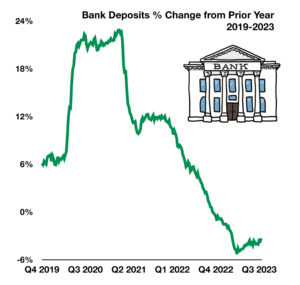Bank Deposits Heading Downwards – Banking Sector Overview
Please choose any of the following articles below that interest you. Each article is listed under the month it was written. Articles written in prior months may still have educational interest.
Consumers have been slowly depositing less money into their bank accounts over the past three years. As the pandemic shuttered restaurants and retail stores in 2020, bank deposits increased as consumers spent less and instead saved their cash. Generous government stimulus programs also led to consumers saving more as unused cash landed in bank deposits.
As businesses reopened and consumers began spending again in 2021, bank deposits fell as consumers decided to spend rather than save. Inflation also contributed to less savings and falling bank deposits as consumers found themselves spending more as the post-pandemic recovery drove prices higher.
Recent higher interest rates offered by banks did entice some to deposit more, yet deposits remain much lower than they were even before the pandemic. Banks struggled for years to capture deposits as rates stood at multi-decade lows up until 2022 when the Fed commenced its rate hike strategy. Some bond analysts believe that rates may start to decline as the Fed reacts to slowing economic data signaling dissipating inflation and consumer confidence.
Source: Federal Reserve Bank of St. Louis; https://fred.stlouisfed.org/series

Print Version: Bank Deposits Nov 2023


